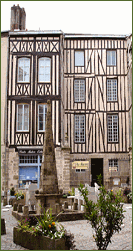|
This area has been inhabited since prehistoric times, and the
Nord-Pas de Calais region has always been one of the most strategic and hence one of the
most fought-over regions of France.
French President Charles de Gaulle, who was born in Lille, called the region a "fatal
avenue" through which invading armies repeatedly passed.
It was conquered in turn by the Celtic Belgae, the Romans, the barbarian Franks and the
Alamanni. It was bitterly contested by England, France and Burgundy in the Hundred
Years' War before finally becoming part of the Kingdom of France in the 15th century.
It was annexed to the Spanish Netherlands in 1598, having been offered as part of a
wedding dowry. The region was re-annexed to France in the 17th century, though not
without considerable opposition on the part of the (mostly Flemish) population. And
it was divided into its present two departements following the French Revolution of 1789.
During the 19th century the region underwent major industrialisation and became one of the
leading industrial regions of France, second
only to Alsace-Lorraine.
Nord-Pas de Calais was barely touched by the
Franco-Prussian War of 1870 and in fact, the war actually helped it to cement its leading
role in French industry due to the loss of Alsace-Lorraine to Germany.
However, it suffered catastrophic damage in the two World Wars of the 20th century.
In the First World War much of the region was occupied by Germany and many of its towns
and hundreds of square miles of land were wrecked in four years of trench warfare, with
the region suffering more damage than any other part of France.
Germany occupied it again in the Second World War and used the region as a launching base
for attacks on England by the Luftwaffe. Heavy Allied bombing and fighting on the
ground again devastated many of the region's towns.
Although most of the region was liberated in September 1944, Dunkirk was not liberated
until 9 May 1945 making it the last French town to be freed from German occupation.
The region's conflicted history is memorialised in numerous war cemeteries and memorials,
such as the Vimy Memorial.
|
|


